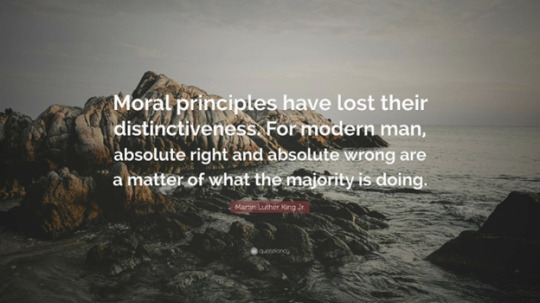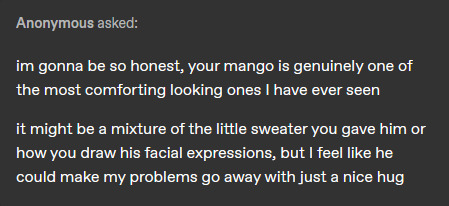#proportionalism
Explore tagged Tumblr posts
Text

The above quote from Martin Luther King, Jr., points out an alarming trend in human behavior: specifically, that matters of right and wrong have become a matter of majority rule. This phenomenon is natural. Psychological studies have shown that the existence of litter in an environment predicts the littering of other individuals. In a generation of AI use, students have increasingly used AI to plagiarize assignments and are more likely to do so when they know that other students are doing it. On the most extreme level, media portrayals of abortions as an option frequently needed and taken can influence the media consumer to agree that abortions should remain widely available.
Catholic theology defies the societal trend of morality becoming a decision of the majority. As Catholics, we maintain that moral absolutes exist and rely on these absolutes, as given to us in the Decalogue (Ten Commandments) and analyzed further in Church teachings. Moral absolutes specify “intrinsically evil acts” and point to what is right by indicating what actions are wrong. In this post, I will answer why moral absolutes are important for Catholic theology. I will also examine why some people reject the idea of moral absolutes, and why this rejection cannot be maintained consistently.
Why are moral absolutes important for Catholic morality and why do some people reject the idea of moral absolutes?
Catholic theology recognizes activity as “morally good when it attests to and expresses the voluntary ordering of the person to his ultimate end and the conformity of a concrete action with the human good as it is acknowledged in its truth by reason” (VS 72). This quote from Veritatis Splendor tells us several features of the Catholic understanding of morality. First, moral good is voluntary. Without the freedom to act, there is no morality. Second, moral good is aligned with a person’s ultimate end. In Catholicism, we understand this ultimate end to be union with G-d. Moral actions contribute to our journey toward this end. Third, moral good consists in concrete actions. In other words, morality is a lived experience and not just an intellectual exercise. Fourth, moral good exists in conformity with the value of reason. When we perform morally good actions, our reason and our will align in pursuit of the good. With a well-formed reason, doing the good makes sense.
In addition to recognizing, encouraging, and applauding morally good activity, Catholic theology recognizes and condemns morally bad activity through moral absolutes. Moral absolutes are one aspect of the Catholic moral framework that contribute to moral good. They provide negative definitions of the tenets of Catholic morality; that is, they tell us what is right by telling us what not to do in order to achieve the right and the good. Though negative, moral absolutes “allow human persons to keep themselves open to be fully the beings they are meant to be” (May, 162).
Moral Absolutes and Catholic Morality
May defines moral absolutes as “moral norms identifying certain types of action, which are possible objects of human choice, as always morally bad, and specifying these types of action without employing in their description any morally evaluative terms” (May, 142). They prohibit “acts which, per se and in themselves, independently of circumstances, are always seriously wrong by reason of their object” (RP, 17). Moral absolutes are important for Catholic morality because all judgments require a standard, and moral absolutes provide a standard for the judgments of Catholic morality. Moreover, the absolutes of Catholic morality have a Divine source, which provides secure authority for its teachings.
Catholic theology has moral absolutes because moral absolutes protect and promote what is good. They do so because moral absolutes function as standards of how failure to achieve moral good looks. Like danger signs, they tell us which actions and spiritual “places” or states to avoid. According to May, “They remind us that some kinds of human choices and actions, although responsive to some aspects of human good, make us persons whose hearts are closed to the full range of human goods and to the persons in whom these goods are meant to exist” (May, 162).
Conscience relies on the existence of moral absolutes. One definition of conscience is “one’s personal awareness of basic moral principles or truths” (May, 59). This awareness, called synderesis in the medieval tradition, refers to “our habitual awareness of the first principles of practical reasoning and of morality” (May, 59). Synderesis requires that principles of practical reasoning and morality exist in the first place. However, another level of conscience exists which refers to “mode of self-awareness whereby we are aware of ourselves as moral beings, summoned to give to ourselves the dignity to which we are called as intelligent and free beings” (May, 60). On this level as well, which tradition has referred to as conscientia, we require moral absolutes. Moral absolutes benefit conscientia by showing the standard to which we are called. Avoid lying to others or harming them. Do not dishonor G-d or one’s neighbor.
On the Rejection of Moral Absolutes
People who reject moral absolutes may fall into the camp of teleological ethical theory, which includes proportionalism and consequentialism. The proportionalist would weigh the “good” and “bad” effects of a moral choice and judge as right any moral decision that the actor perceived as producing more “good” effects than “bad.” The consequentialist would judge an act as right that had the relatively “best” consequences, no matter how one reached those consequences. Both of these moral theologies are called “teleological” because proponents place all focus and emphasis on the end, or telos, of human action.
A charitable proposal for why people may reject moral absolutes is because they get lost in the details of moral situations. For instance, committing credit card fraud is wrong. However, the reasons that one commits it or the details of why someone makes the decision could lead someone to call the action right. One could easily identify as wrong someone who commits credit card fraud to buy the newest smartphone. Committing said fraud to feed oneself or one’s children is still wrong, but the proportionalist would argue that the good of feeding someone outweighs the wrong of credit card fraud. The consequentialist would argue that the good end justifies the evil means.
To look at it from a simpler point of view, people may reject moral absolutes because they want to rationalize actions that are wrong. For instance, I used to be pro-choice. I took a teological viewpoint and argued that allowing free access to abortion would produce the most beneficial consequences for those who were “in need” of abortion, be it due to financial, health, or relational reasons. As a pro-choicer, I argued erroneously that taking the life of an infant through abortion was a justifiable means to avoiding poverty, the potential negative health consequences of pregnancy, and the relational vulnerability of being a mother who had to take care of a newborn (especially for survivors of rape and incest). I rightly understood that extending permission to abort these pregnancies meant doing so for potentially all pregnancies, as well as all reasons to end those pregnancies. Even as the examples in my arguments did not necessarily require abortions, I knew that the emotional charge of the examples gave me the best chance at convincing someone to allow exceptions. As soon as I got someone to allow those exceptions, I would accuse the person of opposing abortion situationally, not on principle, and argue that there was no longer reason to restrict abortion on principle. I knew and know that abortion is wrong, but I went through this exercise in mental gymnastics to convince myself that it was excusable. Now, however, I know and acknowledge the constancy of moral absolutes.
Conclusion
As I stated above, moral absolutes are necessary for this framework of morality because absolutes give the judgments of Catholic morality their standard. As Canavan states, “if there are no absolutes, reasoning collapses into incoherence and yields no conclusions” (Canavan, 93). Without the standard of morality that the Decalogue provides, the claims of Catholic morality hold no more sway than the teachings of other ethical systems. The high standards set by Catholic morality, which we can only reach with the help of grace, would repel many from the ethical system. However, with the established moral absolutes that Catholic morality sets forward, the individual can value and strive to maintain the standards for behavior that the framework sets.
Moral absolutes help us understand our ultimate end of union with G-d in heaven. For one to achieve this union with our Creator, it stands to reason that one must exist in accordance with His plan. After all, the only way to become fit for union with Him is to become like Him. Recognizing the validity of moral absolutes is a vital part of living in accordance with G-d’s plan because appreciating and respecting His work in the universe involves acknowledging and following the laws that He put in place for its functioning. These laws are explained well in the Decalogue but spread out to further applications and specifications elsewhere in Church teaching.
-Esther
---
Canavan, Francis. “A Horror of the Absolute.” The Human Life Review 23, no. 1 (Winter 1997): 91-97.
John Paul II. Reconciliation and Penance. December 2, 1984. The Holy See. https://www.vatican.va/content/john-paul-ii/en/apost_exhortations/documents/hf_jp-ii_exh_02121984_reconciliatio-et-paenitentia.html.
John Paul II. Veritatis Splendor. August 6, 1993. The Holy See. https://www.vatican.va/content/john-paul-ii/en/encyclicals/documents/hf_jp-ii_enc_06081993_veritatis-splendor.html.
May, William E. An Introduction to Moral Theology. Second edition. Huntington, IN: Our Sunday Visitor, 1994.
#catholicism#catholic#catholic theology#moral absolutes#proportionalism#consequentialism#moral theology#morality
4 notes
·
View notes
Text

Hmmm a WIP? Not sure yet if I should shade this or whatever cuz so far it does look pretty great! But anyways I just really wanted to do a little piece that was nice to look at 😌 Soundwave being the ultra security system that he is. And I like the way that security cameras are shaped. So it only makes sense to do a little thing containing both.
#transformers#soundwave#transformer#transformers fanart#transformers art#transformers prime#tfp#tfp fanart#tfp soundwave#i get proportionally the cameras must be huge but it’s like whatever don’t pay attention to that 😒#maccadam
3K notes
·
View notes
Text





some of y'all wanted to hug him, so i obliged <3
#i finally got to animate him proportionately! aaa 💖#alan becker#animator vs animation#animation vs minecraft#avm king orange#avm king#avm mango#avm mt#animation#my art#asks#also thanks to whoever made that heartfelt ask in that first screenshot. that's genuinely so sweet <3
2K notes
·
View notes
Text

im so.so normal about them.very normal
#drift#ratchet#dratchet#tf idw#my art#im haunted with constant dratchet snuggle pose idea thoughts cursed by their designs being insanely clunky nothing ever looks proportionate
3K notes
·
View notes
Text

honey sword 🗡🐝🍯
#bees#fantasy sword#i know the bees and honeycomb are not proportionate. sorry.#the edges are a bit squishy don't @ me I only properly drew the bit going on the actual bookmark#illustration#art
2K notes
·
View notes
Text








*sad trombone noises*
[IDs: 8 screenshots of Matt Mercer during the Legend of Vox Machina season 3 launch party in which he tries and fails to pop a confetti tube, instead accidentally tearing it open. He has the saddest expression. At the end, Laura takes some confetti from the tube and Matt tries to waft it into the air by blowing on it.]
#doing the imgID in the body since it can get repetitive with a set like this & the alt label takes up proportionately more space on mobile#critical role#cr spoilers#tlovm spoilers#(i guess?)#tlovm launch party#cr cast#op
655 notes
·
View notes
Text

"Suck it, weeb-ass BEEETCH!"
Richie loses to Ruth. (She probably cheated)
#I had no plans for this but i guess they're playing some kind of mobile game??? Idk dont look at me okay!!! /silly#Had a few asks sitting in my inbox for awhile (sorry) asking for these two and well i gave it a try 🫡#Something about them looks weird proportionally and it always happens after i draw the clothes SIGH - oh well pretend you dont see it ok#Richie now owes Ruth his lunch for the next three weeks#nerdy prudes must die#NPMD#Hatchetfield#Fanart#Art#richie lipschitz#ruth fleming#Starkid#They should probably have actual phone cases#but i didnt want to draw those tiny extra lines#edit: RICHIE IS TOO TALL!! duh thats the problem. damn who are ya'll letting me make a fool of myself like this huh
807 notes
·
View notes
Text


yellow jacket
#vbros#venture bros#the venture brothers#hank venture#dean venture#admin draws#fanart#really wanted badly to draw shallow gravy hank and it was really about time. hankinator#i really dont draw him proportionally to my love for him. best guy.. idk why my brain insists upon the pink twink#next time i draw that guy it better be more guilt complex stuff. if its not kick me ok <3
248 notes
·
View notes
Text


More Pride & Prejudice fluff that no-one asked for
#so bugged that her face looks PERFECT and darcy's is off#I did so much tweaking and just cant figure out what's proportionally wrong#pride & prejudice#pride and prejudice#mr darcy#elizabeth bennet#my art#artists on tumblr
389 notes
·
View notes
Text

If you're cold, he's cold. Let him in (to eat all of your raw fish)
#eds wips#KINDA....IT'S KINDA FINISHED KINDA NOT....I WANNA COLOR IT BUT ALSO I DONT....UGH....#eds art#jekyll and hyde#edward hyde#my jnh au#this is POV: Lucy looking out her door peephole at 3AM BWHAHAHA#i rawdogged this perspective so i feel like he looks proportionally off model but auagsgh its whatsver
187 notes
·
View notes
Text

what if pre-ascension drainfolk Click Clack though. Drain Clack. Is that anything.
#kettlebird art#great god grove#ggg#ggg click clack#click clack#bizzyboys#Like I said on my last post: literally zero precedent for this concept#outside of Short + Tail#and the fact that he proportionally looks like the bizzies to me#also if you're wondering how he lost his tail#probably something incredibly stupid#prop fell on him backstage or something
281 notes
·
View notes
Text
#he of course has all three but one must be proportionally bigger right#svsss#yue qingyuan#scum villain self saving system#polls
149 notes
·
View notes
Text
one of the funniest things about running this blog is that every time someone posts the most beautiful art of a Miku from their locality they're like "ah I'm sorry I'm late! ah this is so obscure!"
like the queue is so long it can post once every hour and it will STILL keep going into 2025. i've seen mikus of locations and peoples with populations of like four digits. you are never too late or too obscure. post that miku
#meta#btw i still feel bad that miku.earth is down ;-; i promise it's a technical issue that's out of my hands give it a day or two more#i've still been working on it though!!!#once again if anybody has a collection of Mikus no matter how small please throw them my way#and especially if they're of twitter bc I have proportionally not as many twikus (twitter mikus) as i think there are#miku worldwide#hatsune miku
335 notes
·
View notes
Text

Ummm ummmm ummmmm.
Og by @\lilalienz4ever on here and twt!

#disco elysium#kim kitsuragi#harry du bois#uhhhh uhhhhhhhh#original by @lilalienz4ever#this my first fan art ever#of disgo aleisum#i had to start somewhere#even if somewhere means strange little proportionally inaccurate creature versions of the main characters
222 notes
·
View notes
Text

inshallah she will be carried away by the flock
Happy early birthday @iron-sparrow!!!

#sparrow(cake)day#lillian post#watching my game grow slower and slower with each successive sparrow as my heart rate rises proportionally
100 notes
·
View notes
Text


Jeong Fucking Yunho | ATEEZ in Phoenix July 2024
#i know they are so big#its proportionate to the tyranny#jeong yunho#yunho#ateez#ateez gif#yunho gif#ateez yunho#maxsixgif#we call these Sith Yunho gifs#Church Boy got game
194 notes
·
View notes